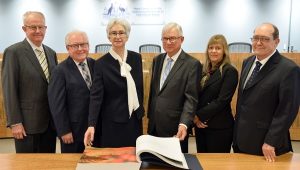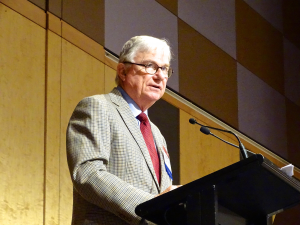
In a world where children (or adult survivors) reporting sexual abuse are frequently ignored, accused of lying, or of having over-active imaginations, Australia’s Royal Commission into Institutional Response to Child Sexual Abuse has been a beacon of hope. The Royal Commission was announced in 2012 and the scope of the 6-year process was enormous, with over 42, 000 calls taken, over 25, 000 letters and emails received, and over 8000 private sessions held for survivors to tell their story. The Commission referred almost 2, 600 cases to authorities, (including the police) and many organisational processes were investigated and will continue to be.
The Royal Commission produced a huge body of work with 11 issues papers published, strengthening all types of institutional responses to reports of child abuse. Of the 122 recommendations made by the Commission, the Commonwealth government has adopted 104 of them, with the remaining recommendations still being considered. A redress scheme is being developed. Bit by bit this enquiry delved into the way in which society has responded to children reporting abuse. The Commission has sat through harrowing stories and painstakingly pieced together a bigger story, a picture of organisational child abuse that is of relevance not only to Australia, but to all societies. International organisations such as the Catholic Church, the Boy Scouts Association, the Jehovah’s Witnesses, the Salvation Army as well as other institutions such as sporting bodies and schools were all exposed as having harboured, enabled and covered up the sexual abuse of children. In a culture where many deny that child sexual abuse occurs in an organised and repeated manner, the stories and details were so overwhelming, so consistent, that they drowned out many deniers.

The Royal Commission took the evidence, the stories, deep into the Australian community. For years the stories of survivors and the cover ups by our most respected organisations were front page news. Importantly, the Royal Commission was generally well-supported by the public. There was no widespread backlash or punitive attempts to silence or disbelieve survivors. Overall, the media was supportive and affirming of the fact that terrible abuse occurred, and was indeed covered up. Tellingly, all six commissioners who began this lengthy process stayed until the end, which was an heroic feat, given the depth and breadth of trauma they were repeatedly exposed to.
The ISSTD awarded the 2018 Media (Written) Award to the six Royal Commissioners and the Senior Counsel Assisting. When writing in ISSTD News (April 2018) about this award, Former ISSTD President Professor Warwick Middleton wrote: “This enquiry represents mankind’s most comprehensive attempt to examine very closely the network of society’s institutions involved in the sexual abuse of children and the manner in which such institutions protect abusers. It was unprecedented in scale and scope. The Australian findings are of direct relevance to all comparable societies.” On the 22nd October, 2018 the work of the Royal Commission reached an important stage of completion when the Australian government issued a public apology to the survivors of institutional sexual abuse. The apology came after a three-month consultation process was held around the nation. Fifty eight face-to-face consultation sessions were organised and over 400 written submissions were examined. The Prime Minister Scott Morrison’s speech included: “Mr Speaker, today, as a nation, we confront our failure to listen, to believe, and to provide justice,” “And, again, today, we say sorry. To the children we failed, sorry. To the parents whose trust was betrayed and who have struggled to pick up the pieces, sorry. “To the whistle-blowers, who we did not listen to, sorry. To the spouses, partners, wives, husbands, children, who have dealt with the consequences of the abuse, cover-ups and obstruction, sorry. “To generations past and present, sorry.”
However, this would not be a story involving politicians, and it would not be a story of child abuse, if it wasn’t complex and full of mixed emotions and conflicting opinions. ISSTD Member and President of the Blue Knot Foundation, Dr Cathy Kezelman was at the Apology. She reports: “It was somewhat overwhelming to be present with such a large group of people who had been so profoundly hurt … and then hurt all over again when seeking help. Emotions ran high – from grief, to rage, and a sense of deep isolation. It was incredibly challenging for some to be in Parliament House, such a symbol of power, with so many other people, and to have travelled so far when safety and trust are such issues. …To hear from their leaders that they had been heard, were believed and that their harm was acknowledged, was very powerful for many. To hear that it was not their fault and that the country is with them was very moving, although not everyone was convinced. Some people walked out. Other heckled. It was not a settled crowd, with much raw distress for many whose lives were so shattered. A moment’s silence was held for those who didn’t make it. “

The person who was the focus of the most enthusiastic spontaneous applause on the part of victims of institutional sexual abuse was an ex-politician, former Prime Minister Julia Gillard, who in late-2012, perhaps aware that she would not be in that role for much longer, went out on a proverbial wing, to announce that her government was establishing the Royal Commission (Gillard was deposed as Prime Minister in June 2013.) During the week of the National Apology reaction from my clients, colleagues and friends has been very mixed. One client, abused in multiple children’s homes and the juvenile justice system, expressed anger that the Prime Minister cried, stating: ‘Those are crocodile tears. He doesn’t care about us. All the politicians want to use us to (make themselves) look good.’ But another, abused by paedophile priests at her local catholic church said it made a big difference to her. Although unable to watch it all as she became too distressed, she said, ‘Normally I feel so alone. Like I am the only one this happened to, but the Apology helped me see I’m not alone. This happened to lots of people.’ She looked up at me and said, ‘I feel less ashamed.’ A third client abused in children’s homes and as a street kid, still feels angry at the lack of help he got from the government and the police. When I asked him how he felt, he laughed and said, ‘It’ll feel a hell of a lot better when they put their money where their mouth is.’
There has been outrage that the Government will express an apology for historic abuse, but at the same time lock up child asylum-seekers in long term detention, under appalling conditions (as is current practice in Australia). Others are angry that physical and emotional abuse was not included in the remit of the Royal Commission. Still others point out that the Royal Commission and the National Apology only addressed sexual abuse in institutions and organisations, meaning that familial sexual abuse was also not addressed. Such diverse reactions led me to reflect deeply on the process for Australia, for all of us as clinicians, wherever we work, and for survivors. For me this is both a personal and a professional story. My experience of growing up Catholic in Australia just meant that abuse was ubiquitous. Teachers, nuns, priests and brothers were well known for harsh physical abuse, emotional abuse, and even sexual abuse. For many of us, our parents, aunties and uncles told stories of terrible abuse (usually physical), meted out in the name of education, training or discipline. (And we would all be naive if we felt this only happened in Catholic organisations.
The Royal Commission certainly showed it did not, though 40% of victims who gave evidence to the Royal Commission in private sessions were abused in Catholic institutions.) Living in a Catholic educational facility for a third of my childhood, with limited family contact, I witnessed much abuse. When I first told an adult that a member of a Catholic religious order was sexually abusing a friend of mine, I was hit and told, ‘not to talk like that about people who have taken the cloth’. In high school, over the years, several of us spoke out about male teachers who were sexually abusing girls as young as 11 or 12. The most frequent responses were to blame the child or ignore the situation. Sadly, a number of those victims never got to hear the Apology as they have taken their lives in the years since. Fast forward a few years. When at university I accompanied a friend to a sexual assault service for counselling. In the waiting room was a large poster of rows of people, all standing with their backs turned to the camera. It was quite eye-catching as normally posters show people front-on. I went closer to read the writing at the bottom. It said, ‘This is what most people do when a child tells them they have been sexually abused.’ It had an enormous impact on me and I vowed never to be one of those adults. I hope I have lived up to this.
For me, personally, the Royal Commission and the National Apology meant a lot, not because of who said it, but because it was an acknowledgment. I also believe our Australian experience is meaningful to all of us in ISSTD. Therapists, particularly those working with organised and extreme abuse, often hear that clients ‘make things up’. The False Memory Wars have not really gone away. Research into the creation of false memories is still mis-understood, mis-interpreted and taken as proof that children are unreliable and prone to ‘making things up.’ Adult survivors speaking out are still routinely doubted and even criticised. The truth is, for almost 200 years in Australia, those who claimed that ‘trusted’ people in power were abusing children, and that institutional sexual abuse of children was real, organised and covered up, were also, often rather automatically, discredited or ignored.
The Royal Commission proved the nay-sayers were wrong. This should have implications for how we treat whistle-blowers and victims on a global scale. For me, the National Apology was not really a day for politicians, many of whom have lost the respect of survivors. It should ideally be a day for us as a community, citizens of this Nation, to publicly and formally say to people who have waited decades to be heard and believed: “We hear you. We know this stuff happens and you have not spoken out in vain. We will be with you.” Only then is a National Apology really taken out of politics and embraced into our shared humanity. To spend just one day supporting these silenced survivors does not mean we ignore those who still suffer. Our Nation, and the world at large, has much work to do in protecting children and enhancing their lives. We need to focus on sexual abuse within the world’s biggest institution: the family. We need to include those who have experienced physical and emotional abuse, both within the family and within organisations. We need to not turn a blind eye when our most powerful organisations continue to abuse children, be that in detention centres, border crossings or churches. Most of all we need to look back at how entire generations cast doubts on the stories of child survivors… and how wrong they got that.

